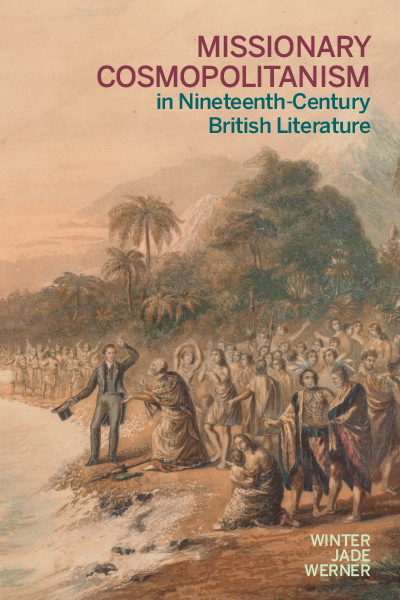“Werner [has a] gift for attentive and original analyses of novels . . . Missionary Cosmopolitanism is a rich first monograph, with ambitious arguments, and readers should look forward to the author’s next projects.” —Kimberly VanEsveld Adams, Victorian Studies
“Werner’s detailed and thoroughly researched work is valuable both to those who are thinking about the changing and important presence of religion and missionary movements throughout the nineteenth century and to those working on cosmopolitanism who might never have considered missionary literature to be a useful or relevant part of the conversation.” —Emily Madsen, Modern Language Review
“Werner’s work offers a valuable new perspective on enduring debates about, and histories of, cosmopolitanism, as well as a rich overview of missionary discourse, ideologies, and practices during the age of empire and beyond.” —Tanya Agathocleous
“This book will prove stimulating not only to scholars of Victorian literature but also to cultural historians and anthropologists interested in the relationship between religion, globalization, and secularism.” —Sebastian Lecourt
Missionary Cosmopolitanism in Nineteenth-Century British Literature explores the notion that missionaries, often perceived as only evangelically motivated in the British imperial project, were also spurred on by cosmopolitan ideals. Winter Jade Werner makes this surprising connection in order to write against standard understandings of missionary work as well as typical understandings of cosmopolitanism as a deeply secular project.
Missionary Cosmopolitanism identifies the nineteenth-century novel as thematically and formally attuned to the tension between missionaries’ cosmopolitan values and the moral impoverishment of their imperialist and expansionist practices. Werner’s chapters interact with canonical works such as Charlotte Brontë’s Jane Eyre and Charles Dickens’s Bleak House, along with lesser-known works by Robert Southey and Sydney Owenson. Ultimately, Missionary Cosmopolitanism demonstrates that nineteenth-century literature both illustrated and helped define missionary discourses regarding cosmopolitan ideas, showing how global evangelicalism continues to tap into the “new cosmopolitanisms” of today.
“Missionary Cosmopolitanism in Nineteenth-Century British Literature provides a welcome new perspective into the complexity of Victorian cosmopolitan engagements and their ongoing relevance to theories of global citizenship today.… [It] is in many ways a model of postsecular literary and cultural studies, illustrating how to bring literature into productive conversation with sermons and other forms of religious writing, a massive and still largely understudied dimension of nineteenth-century print culture.” —Christopher Keirstead, Victorians Institute Journal
“Missionary Cosmopolitanism is … a rewarding and revealing account of an under-examined facet of nineteenth-century religious experience. It provides detailed historical context, and … credibly contributes to a more refined and perceptive vision.” —Matthew VanWinkle, Rocky Mountain Review
“Werner’s rich understanding of the language and debates missionaries engaged allows for fresh readings of familiar novels. … This book is a serious and elegant contribution to Victorian studies’ debates about religion, empire, and cosmopolitanism, one that helps make visible again the complexity of a movement we too often flatten out.” —Sarah Bilston, Journal of British Studies
“Though previous studies have examined Jane Eyre, Bleak House, and Owenson’s The Missionary in light of missionaries and empire, Werner breaks new ground by deeply researching the missionary archive and by showing how missionaries themselves claimed to be cosmopolitan. By identifying missionary cosmopolitanism as a key strand of cultural discourse in the long nineteenth century, Werner creates new contexts for reading both canonical novels such as Jane Eyre and lesser-known texts such as Southey’s Thomas More and Owenson's revision of The Missionary.” —Mary Ellis Gibson, Review 19
“Scholars interested in nineteenth century evangelicalism will find much to admire in Werner's study. Her readings are thoughtful and nuanced....offering a fresh perspective on how missionaries engaged with cosmopolitan discourses to promote—and reevaluate—Christian universalism.” —Molly Watson, Coleridge Bulletin
Winter Jade Werner is Assistant Professor at Wheaton College. She is the coeditor of Constructing Nineteenth-Century Religion: Literary, "Historical", and Religious Studies in Dialogue(OSU Press, 2019)
Contents
Preface
Acknowledgments
Introduction The Only True Cosmopolite
Chapter 1 The Cosmopolitan Idea in Early Nineteenth-Century Missionary Societies
Chapter 2 Robert Southey and the Case for Christian Colonialism
Chapter 3 Universal Kinship and Jane Eyre
Chapter 4 The Missionary, Luxima, and the Forging of a Post-“Mutiny” Cosmopolitanism
Coda The Afterlives of Missionary Cosmopolitanism
Works Cited
Index
Related Titles:

Enlightened Individualism: Buddhism and Hinduism in American Literature from the Beats to the Present
Kyle Garton-Gundling

Constructing Nineteenth-Century Religion: Literary, "Historical", and Religious Studies in Dialogue
Edited by Joshua King and Winter Jade Werner



